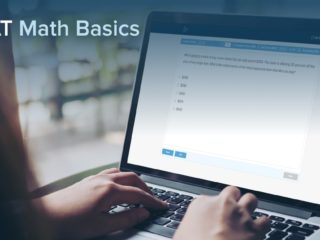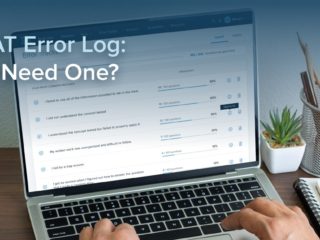| Getting your Trinity Audio player ready... |
Too often, students convince themselves that they are “just not math people.” Thus, they think that they cannot possibly improve their math skills — at least not past a certain level. Unfortunately, the result of this thinking is that these students typically score significantly lower on the GMAT than they are capable of.
If these students instead believed in the power of hard work and perseverance in gaining math proficiency, as nearly all math education experts do, they could set themselves up for higher GMAT scores, more impressive degrees, and higher-paying jobs.
Is GMAT math hard? Sure. But the biggest secret about GMAT math is that anyone can master it, as long as that person is willing to put in the work.
In this article, we’ll look at some research that busts the myth of being “bad at math.” In addition, we’ll give you 4 simple tips for excelling at GMAT math. By following these tips and engaging in smart, effective preparation, you can earn the GMAT score you’re truly capable of.
The biggest secret about GMAT math is that anyone can master it, as long as that person is willing to put in the work.
Here are the topics we’ll cover:
- The Myth of Being “Bad at Math”
- The Myth of Being a “Math Person”
- How to Excel at GMAT Quant: 4 Simple Steps
- Key Takeaways
- What’s Next?
Let’s begin by busting the myth of being “bad at math.”
The Myth of Being “Bad at Math”
If you’ve convinced yourself that you’re simply “bad at math,” you’ve probably held that belief for years. This perspective probably formed long before you began your GMAT prep or even considered taking the exam. Maybe you weren’t as interested in math as you were in other subjects in high school. Maybe you didn’t do so well on the SAT or ACT, or you’ve bombed a GMAT practice test or two. So what? If past performance could perfectly predict future performance, how would anyone ever grow, change, or learn new skills?
The thought that someone is not a math person is just as ridiculous, harmful, and self-limiting as the thought that someone is not a piano person or a ping-pong person. How does someone become skilled at playing piano? By working extremely hard. How does someone become good at ping-pong? By practicing for hours and hours.
So, how does a person excel at math? You guessed it: hard work and hours of practice.
TTP PRO TIP:
Anyone can excel at math with hard work and hours of practice.
What the Research Shows
In 2007, psychologists at Stanford and Columbia University put this damaging myth of being “bad at math” to the test. In a study of nearly 400 seventh-graders over a two-year period, the researchers found that math grades increased for students who believed that intelligence could be developed. Conversely, math grades stayed flat for students who believed that intelligence was unchanging.
Of course, belief alone is surely not enough to increase your knowledge and improve your skills. However, the science shows that believing that there is a ceiling on your abilities could limit what you achieve.
We see similar findings in other research into learning and intelligence. For instance, a growing body of evidence shows that a person’s IQ — long thought to be a fixed quantity — can change pretty significantly over a person’s lifetime.
In fact, IQ is closely linked to factors such as years of school, training in new and complex tasks, and consistent practice. And those changes don’t necessarily take years to happen; research has found that they can occur in weeks or months.
So, if your IQ can increase with studying and practice, why not your GMAT Quant score?
The science shows that believing that there is a ceiling on your abilities could limit what you achieve.
The flipside of the myth that some people are “not math people” is the myth that others are “math people.” Let’s bust this myth as well.
The Myth of Being a “Math Person”
It’s tempting to assume that GMAT math is easy for others, since you don’t see the many steps they’re taking to improve their Quant scores. For instance, you don’t see:
- their late nights of studying math concepts and working through practice problems
- their Saturdays spent taking practice tests
- the dozens of hours they spend with GMAT math tutors
- how many times they took the GMAT before earning a top score on the Quant section
- the math anxiety they have to overcome
Simply put, you don’t get to see the effort that went into the final product.
Also, sometimes people make the process look easy — we’ve all read the stories online. For some people, taking a few practice tests or studying math for a month leads to a Q90 score. But do you know those people’s histories? Do you know whether their parents emphasized math study, or whether they have math-heavy jobs?
Here’s the truth: you don’t have to be a prodigy or someone who has “always” been skilled at something to learn to be great at it. And, more importantly for our purposes, you don’t have to be a math whiz to excel at GMAT math. Solving GMAT math problems requires advanced analytical reasoning skills but not advanced math skills. Do you know what level of math is on GMAT? The actual math concepts in GMAT questions don’t rise beyond those you covered in high school. Do you need innate talent to master high school math? Or do you simply need to put in the work and have confidence that you can succeed?
You don’t have to be a math whiz to excel at GMAT math.
Why This Myth Is Harmful
Maybe in high school or college, you did not perform as well in math classes as some of your peers. You might have assumed that their higher math grades and great test scores were the result of “natural” abilities. It’s easy to make these assumptions because they explain the situation and provide a convenient excuse. Those people are simply better at math than you are!
The problem is, if you believe that you’re not a math person, you’re likely to put in less effort when studying or preparing for math tests. On some level, you’ll feel that your situation is hopeless. And if you don’t put in as much effort, even subconsciously, then your performance actually does suffer. As you continue to perform poorly in math, you see confirmation of your beliefs. The pattern repeats, and the story you’ve told yourself becomes reality.
KEY FACT:
Believing that you’re not a math person harms your math proficiency.
Instead of falling into this self-fulfilling prophecy, you can take steps to improve your math skills. Let’s discuss 4 simple but crucial steps you can take to excel at GMAT Quant.
How to Excel at GMAT Quant: 4 Simple Steps
So, we’ve seen how self-limiting beliefs such as “I’m bad at math” or “I’m not a math person” can affect learning and performance. Of course, earning a high GMAT Quant score is not only about mindset and psychology? Rather, thinking differently about your ability to learn math is the first step to GMAT Quant mastery, not the last.
In fact, there are 4 simple steps that you can take to excel at GMAT Quant:
- Eliminate negative self-talk
- Outwork the competition
- Recognize discomfort as growth
- Practice untimed to master skills and concepts
Let’s explore each of these steps in detail.
Step 1: Eliminate Negative Self-Talk
In over a decade of coaching GMAT students, I’ve found that students who score well on the GMAT tend not to engage in negative self-talk such as:
“I’m bad at math and I can’t improve.”
“I’ll never be able to answer GMAT math problems quickly.”
“My GMAT Quant skills are atrocious.”
Instead, high-scoring students are rational, realistic, and optimistic about their current skills and the effort required to improve a Quant score. Their self-talk is positive, including:
“With hard work and time, I can improve my math skills to a high level.”
“I may not be fast at solving GMAT math problems right now, but I can get faster each day.“
“GMAT math is hard, but I’ve learned difficult subjects before.”
No one denies that GMAT math is hard. In fact, many top-scoring GMAT test-takers initially struggled with the Quant section. However, as the research discussed earlier indicates, when you are optimistic about learning, you are more likely to absorb information. In fact, studies show that positive self-talk improves performance on timed math problems and standardized tests.
Attitude also plays a large role in how effective your studying is. If you’re grumbling every time you study, you’re going to be unhappy and stressed. That stress harms your focus, and your study time becomes less productive.
Instead, before you study, engage in some positive, confidence-building self-talk. If you catch yourself engaging in negative self-talk, stop and put a more positive spin on your thoughts. Tell yourself that what you’re doing is actively improving your skills. Try, even, to view learning math as a fun challenge. You may be surprised at how much more readily concepts stick.
TTP PRO TIP:
Engage in some positive, confidence-building self-talk before you study.
Step 2: Outwork the Competition
Earlier, I mentioned that anyone who is willing to put in the work can master GMAT Quant. The thing is, the work of mastering the Quant section is more than many students expect — even two to three times the amount of work they expect.
The thing is, when it comes to GMAT math, you can outwork your competition to outscore them. If your competition is studying GMAT math for 100 hours, study GMAT math for 200 hours. After 200 hours, you’ll be roughly twice as skilled as they are. If your competition is studying GMAT math for 200 hours, study GMAT math for 300 hours. If you do, you’ll be about 50 percent more skilled than they’ll be. Trust me: when you sit for the GMAT, your work will show.
Not convinced that you could see such a one-to-one correspondence? Scientific research has shown that training has a “dosage-dependent” effect on people’s ability to reason, learn, and solve new problems. In other words, the more you train, the more you improve in these measures of intelligence.
The fact is, people who score high on GMAT Quant are not innately or genetically talented at math. Rather, they just learned more about math than their competition did.
TTP PRO TIP:
To outperform your competition in GMAT math, outwork them.
Step 3: Recognize Discomfort as Growth
One of the essential aspects of outworking your competition is perseverance. Persevering means not being deterred by setbacks, not getting thrown when things are harder than expected, and dealing with discomfort.
Over the years, I’ve seen that the students who went on to earn high Quant scores were those who did not give up on GMAT math practice problems. Conversely, the students who gave into their discomfort and gave up on questions after, say, 60 seconds, saw the smallest increases in their Quant scores.
To master GMAT Quant, you must learn to push through questions. Yes, even when your brain begins to hurt, you feel frustrated and tired, and you’d rather be doing anything else. Generally, if you keep at it and go through the fire of self-doubt and negativity, you will find the answer to the question. Or, you’ll learn what to do for the next question of that type.
On the other hand, if you never work past the point where you feel truly uncomfortable, you won’t experience the learning and growth that goes along with getting over that hurdle.
In fact, you should strive to make discomfort part of your GMAT preparation. Try to reach the point where nothing about the GMAT can shake your resolve. Let’s face it, the process of taking the GMAT is uncomfortable — the test center environment, the hours staring at a computer screen, the time pressure. There is pretty much nothing comfortable about it. If you use your GMAT Quant prep as training for being uncomfortable, you’ll be that much more prepared for the exam.
TTP PRO TIP:
The discomfort of sticking with challenging questions is a key to mastering GMAT Quant.
Step 4: Practice Untimed to Master Skills and Concepts
Another key to mastering GMAT math problems is working on practice questions untimed until your skills improve. The reasoning is simple: if you don’t take the time necessary to reason your way through questions, you don’t actually develop all the necessary skills for answering them.
At first, you may look at a question and not know how to answer it. You may have no idea how to even start solving. Well, getting the answer may take more than two or three minutes. So, guess what? If you give yourself only two or three minutes, you let yourself off the hook. You go to the explanation to get the answer, and you don’t learn to find the answer. How can you master problem-solving strategies if you don’t give yourself time to do so?
Sticking with a question as long as required is an uncomfortable process. But if you want to score high on the GMAT Quant section, it’s a necessary one.
So, when you’re practicing GMAT Quant questions, give yourself the time you need to answer them. Take every opportunity to master skills and learn concepts, even if one question takes you 10 minutes. After you achieve mastery, you can work on answering questions more quickly.
TTP PRO TIP:
To master skills and learn concepts, work on practice questions untimed.
Key Takeaways
We now know that there is no such thing as being “bad at math” or being a “math person.” In fact, the consensus is strikingly clear: you CAN work your way to strong math skills. To achieve an impressive GMAT Quant score, incorporate these 4 steps into your study:
- Instead of being negative about your math skills and ability to improve, engage in positive, confidence-building self-talk.
- Put in the time to outwork your competition.
- Treat discomfort during your GMAT preparation as a chance to learn and grow.
- Work on practice questions untimed to master new skills and learn new concepts.
What’s Next?
Looking for more math tips? Check out these GMAT math strategies for mastering Quant without a calculator and these 25 tips to improve your Quant score.
To learn which math concepts are tested on the GMAT, check out this Quant section breakdown. You can also test your concept knowledge with these GMAT math practice problems with solutions.
Interested in working with a GMAT math tutor? Sign up for a free consultation to learn how working with one of TTP’s expert tutors can take your Quant score to the next level.



